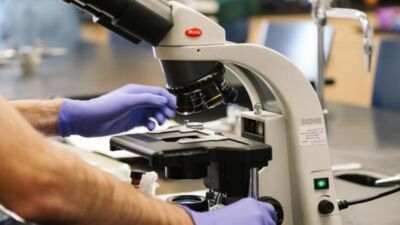Concordia Nebraska's pre-dental program prepares students for a unique career in the sciences

Many people don’t like going to the dentist – but for some students, being able to treat and diagnose conditions of the mouth and teeth is exciting and interesting. Apart from being a highly lucrative career option, dentistry allows students to study specific topics at a higher level and practice as a professional in a field with constant demand. At Concordia Nebraska, the pre-dental program is flexible for students with all needs and interests, allowing them to be ready to attend dental school upon their graduation.
Pre-College Preparation
Even prior to college, students who are interested in the field of dentistry can pursue courses in the sciences. Choosing to take biology, chemistry and physics courses in high school will set students up for further study in these areas – especially if these are Advanced Placement courses. This way, students will enter college prepared to face these topics in even greater depth or even have some college credit completed!
What’s a Pre-Professional Program?
Pre-professional programs are not academic majors; instead, they are suggested groupings of courses that students should take to fulfill specific prerequisites for graduate school or licensure. The pre-medical program, for example, aligns with the common course requirements for entrance into U.S. medical schools. Likewise, Concordia Nebraska’s pre-seminary program provides students with an outline of courses that are useful to take before beginning a graduate program at one of The Lutheran Church-Missouri Synod’s two seminaries.
The Pre-Dental Program
The pre-dental program is similar to the pre-medical program; however, it fulfills prerequisites that are nearly universal for admittance into U.S. dental schools. Students who choose to declare this program as one of their areas of study are not required to choose a specific major. Although many pre-dentistry students choose to major in one of the natural sciences – such as physics, chemistry or biology – this is not the only path to dental school.
The primary goal of the pre-dental program is to prepare students with the knowledge they’ll need to complete the Dental Admissions Test, a standardized exam that is one of several factors considered by dental schools for admission. In addition, almost all dental schools require undergraduates to complete courses in general biology, chemistry and physics before they matriculate. These general courses are all suggested by the pre-dental program.
Working as a Dentist
According to the Bureau of Labor Statistics, the median salary for a dentist is $170,000. Although the education required to become such a professional is extensive and often difficult, the pay reflects the work that students put in before entering the field and the work they do while in it. Practicing as a dentist requires either a Doctor of Dental Surgery (DDS) or Doctor of Medicine in Dentistry (DMD) degree. Afterward, prospective dentists must pass the National Board Dental Examination as well as completing state or regional licensure or certification requirements.
Typically, dentists work full-time in dental offices, orthodontic centers or oral and maxillofacial surgery clinics. They may provide general advice on how to protect one’s oral health, perform procedures that clean and repair the teeth and mouth or examine imaging to diagnose and treat disorders of the mouth. They can work with populations from the very young to the very old or specialize in a number of different areas. Overall, dentists are medical professionals who practice rewarding careers and serve others by furthering their health.
The pre-dental program at Concordia Nebraska is designed to pair with a student’s major of choice to provide them with an appropriate framework for enrolling in graduate-level studies in dentistry. Learn more about the program here.
Interested in Concordia University, Nebraska's pre-dental program?
Related Stories


